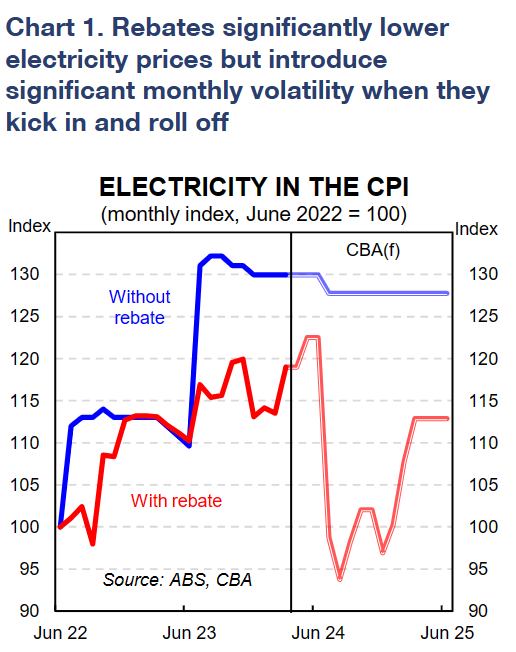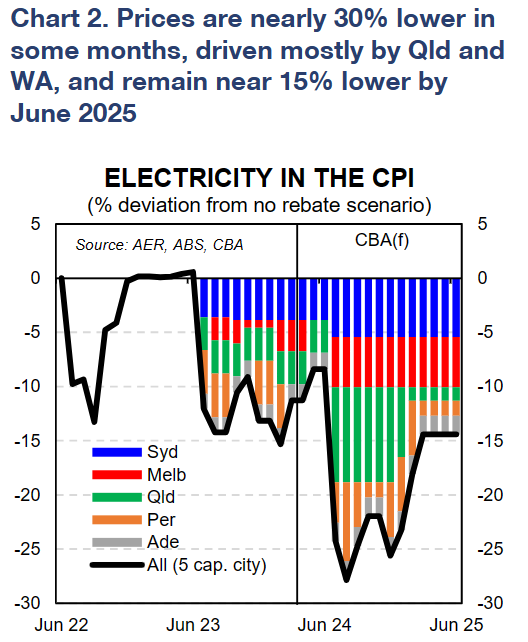By Stephen Wu, Economist at CBA:
Key Points:
- Federal and state government electricity rebates will shave two-thirds of a percentage point off Q3 24 CPI.
- State government rebates in Qld and WA are frontloaded, so the complete impact by Q2 25 is a more modest 0.4ppts.
- An expected 20% fall in electricity prices in Q3 24, could be enough to see annual inflation dip to 3.0%/yr or below.
The Federal government is providing $A300 for every Australian household in electricity rebates from 1 July 2024. The rebate applies automatically and in quarterly instalments.
Some state governments are also providing energy bill relief. The Queensland government is providing a $A1000 rebate for electricity. The WA government is providing a $A400 household electricity credit.
This note estimates the direct impact these rebates have on measured electricity prices and on overall headline CPI inflation.
The impact of the rebates on CPI is substantial:
The Federal government estimates the extension and expansion of energy bill relief to knock 0.5ppts off CPI in 2024/25.
This impact should only affect measured inflation in July 2024 –when the rebates kick in –and in July 2025 –when the rebates unwind.
The quarterly instalments should mean that these rebates depress electricity bills at a constant $A75/qtr or $A25/mth over the financial year.
The Qld and WA state government’s rebates are structured differently. This has implications for measured electricity inflation.
NSW, Tas and SA Budgets are due in June. The Qld rebate is a lump sum payment, credited to households from 1 July 2024.
This should mean that households will not pay any of their electricity bill until the full $A1000 is run down, noting too that $A25 each month is also contributed by the Federal government.
Indeed, the Qld premier noted that “most Queenslanders will not pay a single cent on their first power bill of the next financial year and many won’t pay another bill until 2025”.
The premier also noted that the $A1000 rebate is nearly half of the average Queensland household’s electricity bill for the year.
The WA rebate will be delivered in two instalments of $A200, from “late” July and December 2024.
We assume the first rebate kicks in from the last week of July. The upshot is that the Federal and state government rebates have a material impact on measured electricity prices in the CPI.
As the following charts show, we estimate post-rebate electricity prices will be at times nearly 30% lower than the no-rebate scenario, implying inflation is 0.64ppts lower than otherwise.


By Q2 25, with the Qld and WA impacts faded, prices are still nearly 15% lower, shaving around 0.4ppts off CPI.
The estimated 20%/qtr fall in electricity prices in Q3 24 takes off 0.5ppts from quarterly inflation.
Assumptions:
We only model the largest 5 capital cities. We use the 2024/25 DMO (finalised 23/05) and actual electricity consumption to inform how prices will evolve.
Our estimates are more conservative than the government: where their figures imply annual pre-rebate electricity bill of $A1416 (and a 20% reduction in energy bills owing to the rebate), our estimate of the annual bill is around $A2000 (i.e. rebates reduce bills by 15%).
The Federal rebates are assumed to reduce monthly bills by $A25/mth. In Qld, rebates are calculated to completely cover bills until January 2025.
We do not consider potential changes in consumer behaviour.
The ACCC notes that 79% of customers can reduce their electricity bills if they switched plans.

